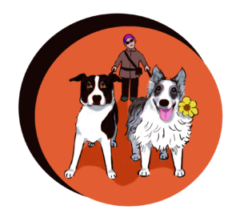CANCELLED due to COVID 19

Coming to Kamloops! We are once again planning a 2-part seminar to help you understand and address your dog’s reactivity, aggression, fear, or frustration. Learn from dog training and behaviour professionals, and exceptional dog-handler teams who will demonstrate what they have learned by using evidence-based behaviour modification techniques. This seminar is hosted by Five Star Dog Training and Being With Dogs.
Register soon! Space is limited.
WHAT: Two-Part Seminar
SPEAKERS: Pat Cutler, Sylvia Currie, and Mary Zacharatos
CONTACT: sylvia@beingwithdogs.ca
WHEN:
Friday April 3: 5:30 – 8:30
Saturday, April 4: 9:00 – 1:00
WHERE: Five Star Dog Training, 340D 12 Avenue, Kamloops, BC
COST:
$175 individuals
$275 for 2 participants from the same household
$157.50 (10% discount) for Cactus K9 Club Members
PAYMENT OPTIONS:
• e-transfer to sylvia@beingwithdogs.ca
• cheque payable to Being With Dogs, #244, 230-1210 Summit Drive, Kamloops, BC V2C 6M1
• credit card (request an invoice)
Note: Payment must be received prior to the seminar in order to secure your registration. A receipt will be sent to the email address you enter on the registration form.
SEMINAR DESCRIPTION:
Does your dog’s reaction to other dogs or people concern you?
In this 2-part seminar we will explore:
• what’s behind that lunging, barking and growling
• how to prevent the problem behaviour from occurring
• ways to HELP your dog
Topics include:
• How dogs learn
• What leads to aggressive and reactive behaviour
• Canine communication
• Management and prevention
• Safety, and emergency handling
• Behaviour modification
• Next steps for you and your dog
We will be bringing in dogs to demonstrate behaviour modification protocols and additional techniques for helping dogs to cope in challenging situations. Your own dog(s) should stay at home.
This seminar will give you the information and tools you need to plan the next steps for helping your dog.
Pat Cutler, Behaviour Consultant
Pat Cutler is a retired veterinary technologist who taught in the vet tech program at TRU for 20 years. During her tenure at TRU, she introduced behaviour and training to the program curriculum and developed 4 levels of theory and hands on learning for the students. During this time she successfully challenged the Certification for Professional Dog Trainers exam. She is a member of the Canadian Association of Professional Dog Trainers and the (American) Association of Professional Dog Trainers. Since retirement from TRU she has introduced Baby Puppy classes to Kamloops vet clinics and also works with private clients to help with dog behaviour problems from manners to fear and aggression.
Sylvia Currie, Being With Dogs
Sylvia Currie is a longtime educator and lifelong learner, with a keen interest in improving dog-human relationships and developing education programs for the prevention of canine behaviour issues. Sylvia’s academic background is in learning design, psychology, and applied sciences. She is an Associate Certified Dog Behaviour Consultant through the International Association of Animal Behaviour Consultants (IAABC), a Certified Behaviour Adjustment Training Instructor (CBATI) and a TTouch Practitioner. Sylvia teaches group life skills and reactive dog classes, and provides customized training and behaviour modification sessions in your home.
Mary Zacharatos, Five Star Dog Training
Mary Zacharatos has been involved in dog training for over 20 years. She keeps her perspective on dog-training fresh and up-to-date by attending seminars and courses offered by respected professionals. She is known for her positive manner and her ability to find the right approach for each individual dog and handler. Having trained a variety of dogs, ranging from terriers to herding dogs, Mary understands the many issues owners face with different breeds of dogs. Mary is also a certified masters judge for the Agility Association of Canada and her dogs have won both the BC Regional competition (3 times) and the Canadian National competition once.


 In preparation for the November 16-17, 2018
In preparation for the November 16-17, 2018 

 I hope to help as many dogs as possible at this upcoming seminar in Merritt! As usual, the fee is nominal – $10 – to remove any barriers for anyone needing this important information to help their dogs.
I hope to help as many dogs as possible at this upcoming seminar in Merritt! As usual, the fee is nominal – $10 – to remove any barriers for anyone needing this important information to help their dogs.
 Videos
Videos YouTube also has a
YouTube also has a 
